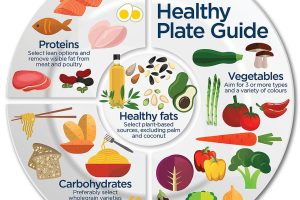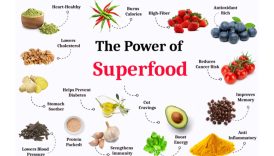From Plate to Progress: Enhancing Your Well-being through Smart Nutrition

In today’s fast-paced world, understanding smart nutrition is essential for maintaining optimal health and well-being. The choices we make about what to eat can profoundly impact our physical and mental states.
- From Plate to Progress: Enhancing Your Well-being through Smart Nutrition
- The Importance of Nutrition
- Understanding Smart Nutrition
- Importance of Balanced Diet
- Nutrient Dense Foods
- Building Healthy Eating Habits
- Meal Planning
- Mindful Eating
- Incorporating Superfoods in Your Diet
- Benefits of Superfoods
- Ways to Incorporate Superfoods
- Impact of Nutrition on Overall Well-being
- Physical Health
- Mental Health
- Nutrition and Weight Management
- Healthy Weight Loss Strategies
- Maintaining a Healthy Weight
- Customizing Your Diet for Specific Goals
- Sports Nutrition
- Weight Management
- The Role of Supplements in Smart Nutrition
- Important Supplements to Consider
- Consulting a Professional
- Budget-Friendly Nutrition Tips
- Eating Healthy on a Budget
- Planning Affordable Meals
- Smart Nutrition for Different Life Stages
- Children and Teens
- Aging Adults
- Exciting Recipes for Nutritious Meals
- Breakfast Ideas
- Meal Prep Suggestions
- Dining Out and Maintaining Smart Nutrition
- Making Healthy Choices at Restaurants
- Portion Control Techniques
- Sustainability and Ethical Considerations in Nutrition
- Plant-Based Diet Benefits
- Sustainable Eating Practices
- Cultivating a Positive Relationship with Food
- Overcoming Emotional Eating
- Building a Healthy Relationship with Food
- Conclusion: Better Living Through Nutrition
- Key Takeaways
The Importance of Nutrition
Consider this: a busy professional might grab a quick coffee and muffin on their way to work. While convenient, this decision may leave them feeling sluggish by mid-morning. To thrive, one must:
- Prioritize a balanced diet.
- Integrate nutrient-dense foods.
- Develop healthy eating habits.
By exploring effective strategies for intelligent nutrition, everyone can make informed choices that promote a healthy lifestyle and foster long-term well-being.
Understanding Smart Nutrition
After recognizing the foundational role nutrition plays in our lives, it becomes clear that understanding smart nutrition is crucial.
Importance of Balanced Diet
A balanced diet acts like a well-tuned orchestra, where each food group plays a vital role. For instance, when Jenny introduced more fruits, vegetables, and whole grains into her meals, she noticed increased energy and better concentration. Key components of a balanced diet include:
- Fruits and vegetables: Aim for a rainbow of colors.
- Whole grains: These provide fiber and essential nutrients.
- Proteins: Include healthier options like beans, fish, and lean meats.
Nutrient Dense Foods
Nutrient-dense foods are exceptionally beneficial, packed with vitamins and minerals without excessive calories. Think of foods like spinach, quinoa, or blueberries. To enhance your meals, focus on adding:
- Leafy greens: Great for salads and smoothies.
- Lean proteins: Chicken, turkey, or legumes.
- Healthy fats: Avocados, nuts, and olive oil.
By consciously selecting nutrient-dense options, individuals can maximize their health benefits while enjoying flavorful meals.
Building Healthy Eating Habits
Having established the significance of understanding smart nutrition, the next step involves building healthy eating habits that can sustain long-term wellness.
Meal Planning
Meal planning can transform chaotic eating habits into a structured, enjoyable experience. When Mark began planning his meals each week, he found that he saved time, money, and made healthier choices. To start meal planning effectively, consider these tips:
- Choose a specific day: Dedicate time each week to plan your meals.
- Make a grocery list: Stick to your list to avoid impulse buys.
- Prep in advance: Chop vegetables or cook grains to save time during the week.
Mindful Eating
Mindful eating, on the other hand, focuses on paying attention to the eating experience. It involves savoring each bite and recognizing hunger cues. For example, Sarah used to eat lunch in front of her computer but found that taking a break to enjoy her meal led to greater satisfaction. Here are ways to practice mindful eating:
- Eliminate distractions: Turn off screens during meals.
- Chew slowly: Allow time to savor flavors and textures.
- Listen to your body: Stop eating when you feel satisfied, not stuffed.
By integrating meal planning and mindful eating, individuals can cultivate healthier, more enjoyable eating habits that support their overall well-being.
Incorporating Superfoods in Your Diet
As you continue to build healthy eating habits, incorporating superfoods into your diet can amplify your nutritional benefits.
Benefits of Superfoods
Superfoods are nutrient powerhouses, rich in antioxidants, vitamins, and minerals. For instance, when Lisa started adding chia seeds to her smoothies, she noticed an improvement in her energy levels and digestion. The benefits of including superfoods in your diet include:
- Boosted immune function: Nutrient-dense options like garlic and spinach help strengthen immunity.
- Enhanced energy: Foods like quinoa and acai berries provide sustained energy without spikes or crashes.
- Improved mental clarity: Blueberries are known for their brain-boosting properties.
Ways to Incorporate Superfoods
Integrating superfoods into your daily routine can be simple and enjoyable. Here are a few creative ways:
- Smoothies: Blend leafy greens, berries, and a scoop of spirulina for a nutritious boost.
- Salads: Toss in ingredients like walnuts, avocado, or goji berries for added flavor and health benefits.
- Snacks: Choose kale chips or dark chocolate-covered almonds for a satisfying treat.
By exploring the ways to incorporate superfoods into meals and snacks, you’re investing in a healthier, vibrant lifestyle!
Impact of Nutrition on Overall Well-being
Embracing smart nutrition profoundly impacts overall well-being, influencing both physical and mental health in remarkable ways.
Physical Health
Nutrition serves as the foundation for physical health. When David started focusing on a balanced diet, including whole grains and lean proteins, he experienced significant improvements in his energy levels and stamina for workouts. Benefits of good nutrition for physical health include:
- Weight management: Helps maintain a healthy weight and reduces obesity risks.
- Disease prevention: A nutrient-rich diet can lower the risk of chronic diseases, such as heart disease and diabetes.
- Enhanced immunity: Proper nutrition bolsters the immune system, making one more resilient to illnesses.
Mental Health
Nutrition also plays a crucial role in mental health, influencing mood and cognitive function. When Emma incorporated omega-3-rich foods like walnuts and fatty fish into her diet, she noticed a reduction in her anxiety levels. Important points to consider include:
- Mood stabilization: Foods rich in vitamins and minerals can help alleviate symptoms of depression and anxiety.
- Cognitive function: Nutrient-dense diets support brain health, leading to better concentration and memory.
- Stress management: Consuming antioxidants from fruits and vegetables can combat stress effects on the body.
By understanding the impact of nutrition on both physical and mental health, individuals can make empowered choices that lead to a healthier, fulfilled life.
Nutrition and Weight Management
Recognizing the profound relationship between nutrition and overall well-being naturally leads to the vital topic of weight management. By adopting the right strategies, individuals can achieve healthy weight loss and maintain their ideal weight.
Healthy Weight Loss Strategies
When Sarah decided to focus on her nutrition for weight loss, she shifted her approach to include healthier foods rather than drastic calorie-cutting. Effective strategies she found included:
- Setting realistic goals: Aim for 1-2 pounds of weight loss per week.
- Incorporating physical activity: Combine cardio and strength training to burn calories and build muscle.
- Tracking intake: Keeping a food diary can reveal eating habits and areas for improvement.
Maintaining a Healthy Weight
Once the desired weight is achieved, maintenance becomes the next challenge. Tom learned that sustaining a healthy weight requires ongoing commitment. Here are some key tips for weight maintenance:
- Continue portion control: Be mindful of serving sizes to prevent overeating.
- Stay active: Engage in regular physical activity, aiming for at least 150 minutes weekly.
- Make it a lifestyle: Focus on balanced, nutrient-dense eating rather than short-term diets.
By embracing these healthy strategies for weight loss and maintenance, individuals can cultivate a sustainable lifestyle that promotes their overall health and happiness.
Customizing Your Diet for Specific Goals
With a solid understanding of nutrition and its relation to weight management, it’s essential to customize your diet to achieve specific health goals. Whether you’re an athlete or someone focused on weight management, tailored nutrition can make a significant difference.
Sports Nutrition
For athletes like Mia, a well-rounded sports nutrition plan can enhance performance and recovery. When she began prioritizing her nutrition, she noticed marked improvements in her energy levels and stamina during training. Key components of sports nutrition include:
- Carbohydrate loading: Fuel with complex carbs before intense workouts.
- Protein intake: Ensure adequate protein post-exercise for muscle recovery.
- Hydration: Maintain fluid balance to support performance and recovery.
Weight Management
On the flip side, tailoring nutrition for weight management focuses on mindful choices. John realized that small adjustments made a positive impact when he refined his diet. Consider these tips:
- Balanced meals: Include protein, healthy fats, and fiber to enhance satiety.
- Healthy snacking: Choose nutrient-dense snacks, such as nuts or yogurt.
- Limit processed foods: Reduce refined sugars and unhealthy fats for better weight control.
By customizing your diet for sports nutrition or weight management, you can effectively pursue your goals and enhance your overall health and fitness journey.
The Role of Supplements in Smart Nutrition
As you refine your diet further, understanding the role of supplements can enhance your nutritional intake and overall wellness. While whole foods should always be the priority, certain supplements can provide valuable support.
Important Supplements to Consider
When Jane explored supplementation, she discovered that some essential nutrients were lacking in her diet. Here are a few important supplements to consider:
- Multivitamins: Fill nutritional gaps and ensure you get essential vitamins.
- Omega-3 fatty acids: Support heart and brain health, especially if you don’t consume enough fish.
- Vitamin D: Crucial for bone health, especially in those with limited sun exposure.
Consulting a Professional
Before diving into supplementation, consulting a nutrition professional can provide clarity and guidance. When Mark sought advice from a registered dietitian, he received personalized recommendations tailored to his lifestyle and needs. Benefits of professional consultation include:
- Tailored advice: Get recommendations based on blood work and dietary habits.
- Safety measures: Avoid potential interactions with medications or over-supplementation.
- Education: Learn about the benefits and limitations of different supplements.
By understanding the role of supplements and seeking professional guidance, you can make informed decisions that support your health goals effectively.
Budget-Friendly Nutrition Tips
As you continue to navigate the landscape of smart nutrition, budget-friendly practices can make a significant difference in your journey. Eating healthily doesn’t have to break the bank.
Eating Healthy on a Budget
When Laura started tracking her grocery spending, she quickly realized that eating healthy was achievable without overspending. Here are some practical tips she applied:
- Shop seasonally: Seasonal fruits and vegetables tend to be cheaper and fresher.
- Buy in bulk: Purchase grains, nuts, or legumes in bulk to save money.
- Choose store brands: Often, store brand products offer similar quality at a lower price.
Planning Affordable Meals
Meal planning can also keep your grocery budget in check. Mark found that taking a little time each week to plan meals made a significant impact. Consider these strategies:
- Create a weekly menu: Plan meals around what’s on sale at your local grocery store.
- Batch cooking: Cook larger portions of meals to save time and money throughout the week.
- Use leftovers wisely: Transform leftovers into new meals to minimize waste.
By implementing these budget-friendly nutrition tips, anyone can embrace a healthier lifestyle while keeping expenses in check.
Smart Nutrition for Different Life Stages
As we delve deeper into the concept of smart nutrition, it’s crucial to recognize that nutritional needs vary significantly across different life stages. Understanding these variations can help ensure that everyone, from picky eaters to wise elders, receives optimal nourishment.
Children and Teens
For children and teens, nutrition plays a pivotal role in growth and development. When Emily focused on providing her kids with nutritious meals, she noticed their energy levels soared. Key considerations for this age group include:
- Balanced meals: Include a mix of carbohydrates, proteins, and healthy fats.
- Encourage variety: Expose children to different foods to develop their palate.
- Limit processed snacks: Opt for fruits, nuts, and whole grains instead.
Aging Adults
Conversely, aging adults often face unique nutritional challenges. Tom found that adjusting his diet helped manage his health conditions and maintain energy levels. Important dietary tips for older adults are:
- Focus on fiber: Increase intake of whole grains, fruits, and vegetables for digestive health.
- Stay hydrated: Encourage regular fluid intake to support overall wellness.
- Nutrient density: Emphasize foods rich in vitamins and minerals, like leafy greens and lean proteins.
By tailoring nutritional approaches for children, teens, and aging adults, everyone can achieve a healthier lifestyle that supports their specific needs.
Exciting Recipes for Nutritious Meals
As we explore the practical side of smart nutrition, incorporating delicious and nutritious recipes can make healthy eating enjoyable and fulfilling. Here are some exciting ideas to inspire your meals.
Breakfast Ideas
A nutritious breakfast sets a positive tone for the day. For example, when Sarah started her mornings with overnight oats, she felt energized and satisfied. Here are quick and tasty breakfast options:
- Overnight Oats: Combine rolled oats, almond milk, chia seeds, and your favorite fruits.
- Veggie Omelet: Whisk eggs and add spinach, tomatoes, and feta for a protein-packed meal.
- Smoothie Bowl: Blend spinach, banana, and Greek yogurt, and top with berries and nuts.
Meal Prep Suggestions
Meal prepping can simplify your week and ensure you have nutritious options on hand. When John adopted meal prep, he found it transformed his eating habits. Here are some helpful strategies:
- Batch Cooking: Prepare a large pot of quinoa or brown rice to use throughout the week in various dishes.
- Mason Jar Salads: Layer ingredients from hearty veggies to grains for easy, grab-and-go lunches.
- Frozen Smoothie Packs: Pre-pack smoothie ingredients in bags for quick morning blending—just add liquid!
By experimenting with these breakfast ideas and meal prep suggestions, you can enjoy nutritious, satisfying meals that support your smart nutrition journey.
Dining Out and Maintaining Smart Nutrition
Transitioning from home-cooked meals to dining out can pose challenges in maintaining smart nutrition. However, with a bit of planning and mindfulness, it’s possible to enjoy restaurant meals while making healthy choices.
Making Healthy Choices at Restaurants
When Rachel started focusing on nutrition, she realized that she could still enjoy dining out without derailing her health goals. Here are some tips she found useful:
- Review the menu ahead of time: This allows you to identify healthier options without rushing.
- Opt for grilled or baked options: Choose dishes that are prepared using healthier cooking methods.
- Stay hydrated: Drink water or unsweetened beverages instead of sugary drinks.
Portion Control Techniques
Controlling portion sizes can significantly help in maintaining your nutritional balance. Tom discovered effective techniques that worked for him:
- Share dishes: Sharing an appetizer or dessert can reduce portion sizes while allowing you to enjoy a variety of flavors.
- Ask for half portions: Don’t hesitate to request smaller servings when available.
- Use smaller plates: If the restaurant offers them, opt for smaller plates to naturally control portion sizes.
By implementing these strategies when dining out, you can maintain your commitment to smart nutrition while indulging in the culinary experience restaurants offer.
Sustainability and Ethical Considerations in Nutrition
As we delve deeper into the idea of smart nutrition, it’s essential to consider sustainability and ethical practices. Making conscious food choices not only enhances personal health but also positively impacts the planet.
Plant-Based Diet Benefits
When Lisa switched to a more plant-based diet, she was pleasantly surprised by the benefits she experienced. Not only did she feel more energetic, but she also enjoyed a variety of delicious meals. Key advantages of a plant-based diet include:
- Reduced environmental impact: Plant-based eating requires fewer resources compared to animal agriculture.
- Improved heart health: A diet rich in fruits, vegetables, legumes, and whole grains can lower cholesterol levels.
- Increased nutrient intake: Plant foods are often high in fiber, vitamins, and antioxidants.
Sustainable Eating Practices
Incorporating sustainable eating practices can further enhance the positive effects of your diet. When Mark adopted sustainable habits, he felt more connected to his food sources. Here are some strategies to consider:
- Shop local: Support farmers’ markets and local producers to reduce carbon footprints.
- Choose seasonal produce: Emphasizing fruits and vegetables that are in season cuts down on transportation emissions and supports local agriculture.
- Minimize food waste: Plan meals carefully and use leftovers creatively to ensure nothing goes to waste.
By embracing plant-based diets and sustainable practices, individuals can make impactful choices that benefit both personal health and the environment.
Cultivating a Positive Relationship with Food
As we integrate sustainability and ethics into our nutrition, it’s equally important to focus on cultivating a positive relationship with food. Doing so paves the way for long-term wellness and enjoyment in eating.
Overcoming Emotional Eating
When Jane recognized her tendency to eat emotionally—turning to snacks during stressful times—she sought healthier coping mechanisms. Some effective strategies she discovered included:
- Mindfulness practices: Engaging in activities like yoga or meditation can reduce stress and mitigate the urge to eat emotionally.
- Journaling: Keeping a food journal helped her identify triggers and patterns associated with emotional eating, giving her insight into her behaviors.
- Healthy alternatives: Instead of reaching for chips, she started opting for fruit or nuts when cravings struck.
Building a Healthy Relationship with Food
Building a healthy relationship with food starts with viewing it as nourishment rather than a reward or punishment. After Mark shifted his mindset, he found joy in meal prep and cooking. Here are some tips to foster this relationship:
- Practice gratitude: Acknowledge and appreciate the work that goes into producing food, from the farmers to the cooks.
- Savor each bite: Slow down and truly enjoy your meals to create a more satisfying experience.
- Avoid labeling foods: Instead of labeling foods as “good” or “bad,” focus on balance and moderation.
By overcoming emotional eating and cultivating a positive relationship with food, individuals can enjoy their meals while nurturing their bodies and minds.
Conclusion: Better Living Through Nutrition
As we wrap up our exploration of smart nutrition, it’s clear that the choices we make about what we eat significantly influence our overall well-being. Embracing mindful eating and understanding our nutritional needs at various life stages can lead to a healthier, more fulfilling life.
Key Takeaways
Reflecting on the journey, a few essential points stand out:
- Balance is essential: Aim for a variety of foods to ensure you’re getting the necessary nutrients.
- Sustainability matters: Opt for practices that benefit both your health and the environment.
- Positive relationships with food: Cultivating a healthy mindset around eating can enhance your enjoyment and satisfaction.
By implementing these principles into daily life, individuals can foster better living through nutrition, ultimately paving the way for improved health, happiness, and vitality.





